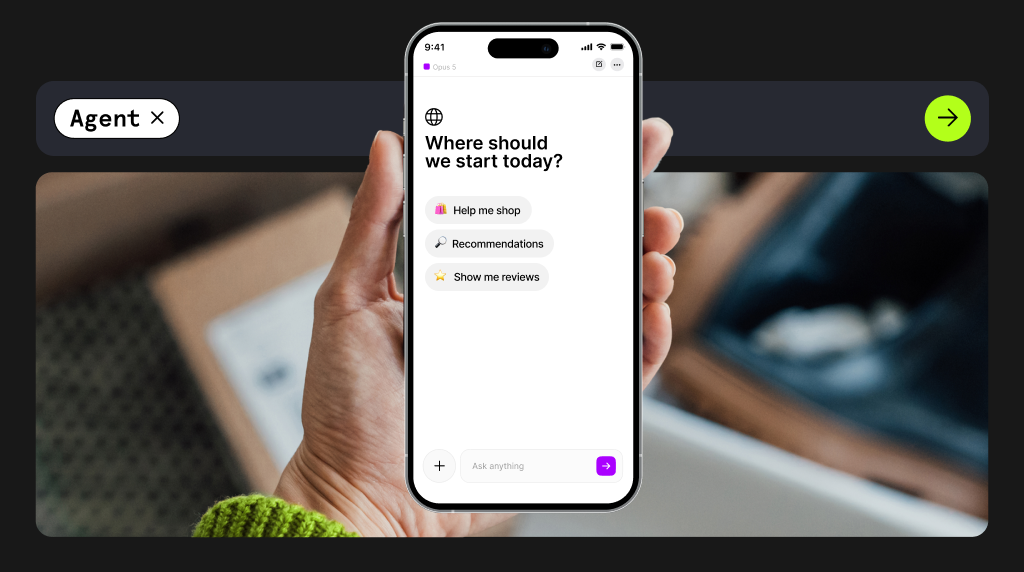Agentic commerce will change how decisions are made. Instead of tapping and browsing, people will assign tasks to AI-powered systems – agents that scroll, search, and shop on their behalf, using set parameters like price, brand, availability, shipping date, and return policy.
Google’s “shop with AI mode” has introduced agentic checkout features designed to track prices and complete purchases automatically. Visa’s Intelligent Commerce gives agents secure, structured access to its payments network, and Mastercard is rolling out Agent Pay, designed to let AI agents complete tokenized, transparent transactions on behalf of users. At Checkout.com, we are collaborating with our partners and merchants to construct and shape this future. Together with Mastercard, we’re building on the tokenization frameworks to support a future where intelligent agents transact on behalf of users, securely and transparently. And with Visa, we’re one of the first to bring account-to-account payments to market in the UK, setting a new benchmark for speed, security, and performance.
While the technology evolves, what’s clear is that for marketing, brand, and ecommerce leaders, agentic commerce brings fundamental change. Your next customer may never land on your homepage. To make your brand visible in an agent purchase decision, you need to fundamentally think about how your brand is searched, the offer presented and conversion delivered to machines rather than humans. The new purchase journey requires data, embedded in your APIs, and communicated in a format machines understand and process.
Search is already changing, and fast
ChatGPT and other Gen AI search tools are cutting into Google’s lead in traditional search. Among Gen Z, 82% now use AI search tools to guide purchasing. And 53% of adults say they’d rather search with AI than use Google search.
AI tools can now scan for signals like ratings, reviews, and responsiveness, filtering them through their own logic. What ranks isn’t just what people trust, but what machines recognize as credible. Generative Search Optimization (GEO) works differently to SEO, moving beyond “keywords” and backlinks, being able to process long format highly structured data from reputable sources.
To stay discoverable, brands need to perform well on both GEO and SEO. And the pace is only accelerating. ChatGPT grew from 100 million weekly active users in late 2023 to 400 million by early 2025. The mobile app alone now drives 175 million users a week, and is growing between 5-15% month-on-month.
The impact is already visible. Checkout.com’s Trust in the Digital Economy report shows that more than half of regular online users are engaging with AI tools like voice search, image recognition, and virtual try-ons. In the UK, AI-driven traffic to retail sites has surged 500% in just five months – led by Gen Z consumers, and consumers in China, and Middle East and North Africa.
Visa’s Chief Product and Strategy Officer, Jack Forestell, put it simply: “We see tremendous potential for the role AI agents will play in commerce.” And the projections back it up – within a year, agents could be handling one in five ecommerce tasks.
With 55% of weekly online shoppers already using AI to search, agentic behavior is quickly becoming the norm.
Visa CEO Ryan McInerney told Bloomberg Technology in an interview, these agents will “scour the world’s inventory.” And Satya Nadella, Microsoft’s CEO, says “AI agents will become the primary way we interact with computers in the future.”
Agents potentially could work best on journeys that are either complex or time-consuming, like booking travel, comparing financial products, or managing subscriptions.
When Agents shop, does your brand still show up?
Agents won’t behave like humans. They don’t get persuaded by a nice banner ad. They process inputs based on preferences set by us - price, availability, shipping options, and return policies, and make decisions accordingly.
If your product doesn’t meet these criteria, it could be excluded. There’s limited or no opportunity for persuasion or brand storytelling. This shift disrupts the traditional marketing funnel, as the customer is no longer the operator, the customer operates an agent.
So where does your brand show up in this new flow?

Agents will simplify the steps of online shopping. Instead of scrolling through endless product pages, customers can instruct AI assistants to find exactly what they need. Removing the need for manual searches or scrolling through product pages – just instant recommendations and the option to buy within the chat.
Real-world examples already in motion:
- AI-powered gifting: An AI assistant generates gift ideas, compares prices, and completes the order.
- Automated deal hunting: AI tracks price drops and executes at optimal times.
- Subscription-based replenishment: AI predicts when users will run out of a product and reorders automatically.
When agents are the ones searching, consumers see fewer ads and engage in fewer touchpoints. What used to be a visual, brand-led journey becomes a functional one. That’s why credibility matters more than ever. You have to be present in the places that algorithms associate with authority – because that’s what informs the next recommendation, the next shortlist, and the next purchase.
When someone asks ChatGPT or Gemini for the best option in your category, where does that answer come from? It’s drawn from trusted editorial sources, trade coverage, expert quotes – not from your latest marketing campaign or owned content channels.
That’s where trust gets built for the machines, and that’s what gets you shortlisted on an agent's shopping list.
Are brands ready for agentic commerce?
Mastercard CMO Raja Rajamannar acknowledges that handing over so much control to agentic AI is “scary,” particularly because it changes the fundamental nature of marketing. “Now I’m talking to your machine, not you, and your machine has none of your feelings or emotions,” he told Marketing Week. “From being a psychological exercise, it suddenly becomes an algorithmic exercise in how to market to people.”
This change raises a critical question: how do you market to a machine?
David Birch argues that brands need to “think code, not copy.” In a Business to Robot to Consumer (B2R2C) model, consumer agents interact directly with brand agents through structured data sets – never seeing the ad or the campaign at all. What matters isn’t your message – it’s whether your machine speaks the right language.
The fundamentals of marketing still apply – knowing your customer, understanding their preferences, and mapping their purchase intent. But acquisition, conversion, and retention tactics will all evolve.
For B2B marketers, the same transformation is coming. Generative AI will begin to orchestrate account-based marketing (ABM) – delivering sharper personalization, faster. And just as social media platforms raised the bar for interest and intent in consumer marketing, agents could soon do the same in B2B. Rapidly searching the web for what customers say about B2B products, grabbing data from internal systems and mapping to personas to create automated personalized messaging for campaigns.
In this future, some existing truths are amplified. The stuff we enjoy, we’ll continue to do ourselves. But the dull, time-consuming, or low-consideration purchases? We’ll delegate those to agents. Retail has always been about delivering exceptional experiences at the moment of sale – whether traditional, online, digital, or now: agentic.
What does marketing look like when the journey is zero-click?
AI agents are cutting out the clicks. Zero-click search is rising fast, with people getting answers directly – no browsing, no homepage, no funnel. That’s already having an impact. However, people still enjoy shopping. It’s a habit, and for many, a hobby. That’s not going away, as long as people enjoy it!
Still, the tech behind the experience is evolving quickly. For brands, especially those in ecommerce, it’s time to tune your systems to agentic behavior. That means aligning your data, authentication, and security flow with how agents shop.
The building blocks already exist. Tokens, metadata, and authentication flags can smooth out transactions and reduce false declines. And most platforms – ecommerce sites, gateways, acquirers, fraud tools – can make this leap with relatively minor tweaks.
So what does the journey look like?
It starts before the customer knows it. A prompt, a voice request, a swipe in a smart assistant interface – and the transaction is underway. There’s no traditional landing page. No checkout flow. Just intent, interpreted and acted on by an agent. The role of the brand is to be discoverable, trusted, and technically ready to support this shift. That means shaping products, systems, and content for machines before humans. Marketers will still be the ones shaping brand narratives, guiding agent behavior, and keeping every interaction on-message and on-brand.
Prepare now, or risk getting left behind
Agentic commerce is opening new doors across the payments ecosystem. From banks and fintechs to merchants and PSPs, the opportunity is there – but it depends on readiness. Systems will need to handle autonomous payments, richer data signals, and faster, more personalized flows. And they’ll need to do it securely, without slowing anything down.
AI agents don’t scroll, compare, or click the way humans do. They look for structured information they can trust. They make decisions before your homepage even loads. And if your content isn’t ready for that kind of discovery, you won’t be part of the shortlist.
Being visible in this new model is all about preparing what you already have, and making sure it’s built to be found.
It’s also about scaling innovation safely. That’s why regulators and tech partners are stepping in. The FCA has launched a new AI collaboration with NVIDIA to help firms test and deploy trusted AI at scale. Jessica Rusu, the FCA’s Chief Data, Intelligence and Information Officer, said: “This collaboration will help those that want to test AI ideas but who lack the capabilities to do so. We’ll help firms harness AI to benefit our markets and consumers, while supporting economic growth.
Dr Jochen Papenbrock, EMEA Head of Financial Technology at NVIDIA, added: “AI is fundamentally reshaping the financial sector by automating processes, enhancing data analysis and improving decision-making, which leads to greater efficiency, accuracy, and risk management across a wide range of financial activities.”
Powering payments in an agent-led world
So while the agent may be doing the shopping, trust still drives the transaction. No matter how the agent-merchant relationship evolves, what’s needed is a global payment network that can validate identity, build trust, and enable secure interactions between systems.
How ready is your business for agentic commerce?
As AI agents take on more responsibility in the buying journey, now’s the time to assess how prepared your systems, teams, and infrastructure are, and to start mapping the steps that will keep you ahead.






.png)






_How%20and%20why%20to%20launch%20a%20card%20program%20(1).png)


